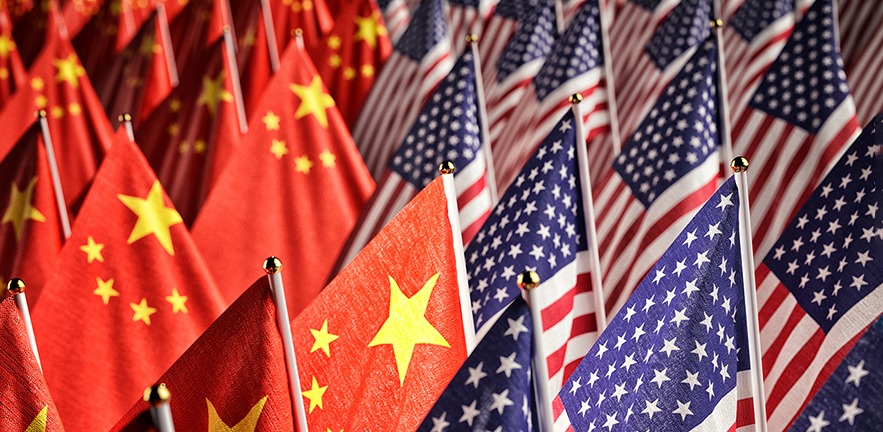The shift of US attitudes on China owes as much to American disappointments as it does to changes in China’s behaviour, says Simon Taylor, Faculty (Professor level) in Management Practice (Finance) at Cambridge Judge Business School.
By Dr Simon Taylor

After the revolution that brought the Chinese Communist Party to power in 1949, a shocked US foreign policy establishment began an internal blame game as to who “lost” China. The US had previously underestimated the Communists and urged nationalist leader Chiang Kai-Shek to stop attacking them in the interest of avoiding civil war, thereby allowing Mao Zedong’s forces to regroup and ultimately defeat Chiang. The appearance of Mao in Moscow’s Red Square, alongside Stalin, in December 1949, appeared to confirm the US’s worse nightmare of a global communist conspiracy.
The idea that the US might somehow have kept China as a non-communist ally is rather fanciful. But a later generation of foreign policy wonks has in recent years wondered anew if they made avoidable mistakes that allowed China to become the “strategic competitor” that President Trump officially designated it in his first National Security Strategy, in 2017.
The US foreign policy establishment’s mistake
The broadly accepted narrative in the US foreign policy world goes something like this.
“We encouraged China to re-enter the world economy, gave it access to our markets, welcomed it into the World Trade Organisation, all the while trusting that China would become a responsible stakeholder and partner in the rules based system (that we created and oversee). We also believed that through the unavoidable force of mass prosperity, a new Chinese middle class would demand political freedoms and China would evolve into something vaguely democratic.
Yet we now find that China has done neither of these things. It is increasingly nationalistic and hostile to the US and, far from upholding the rules based order, China is creating its own, competing international system. And as for democracy, we now see that China is even more authoritarian than before, and is using advanced technology to control its people.”
There is a kind of conceit in the idea that the US has any material influence on the world’s currently most populous country. It is also very strange that these foreign policy analysts (and indeed Presidents Bush senior and Clinton) seemed to buy the “prosperity-inevitably-leads-to-democracy” argument.
It is true that most of the world’s most prosperous nations (aside from natural resource states) are democratic, and most of them became rich at the same time as they became democratic (the US was more fully democratic before industrialisation, Europe and Japan became more democratic with mass industrialisation). But in the last 50 years, there are only two examples of economies that went from authoritarian, state-led industrialisation to western-style democracy: Taiwan and South Korea (*).
As evidence for a theory of prosperity inevitably leading to democracy, this is pretty weak. It is tempting to see US (and to some extent other western countries’) politicians and advisors as succumbing to wishful thinking, and rather ignoring the evidence of what was actually happening in China itself.
China never pretended that it was converging on a western-style political evolution. While there have always been debates inside the Chinese Communist Party about tactics, there has never been any serious faction arguing for what the US or Europe would recognise as pluralist democracy.
So the US establishment fooled itself. And in a famous article in Foreign Affairs in 2018, Kurt Campbell (now the head of Asia Pacific on President Biden’s National Security Council) and Ely Ranter, more or less admitted this fact. The article is called “The China reckoning – how China defied US expectations”. They write: “With US President Richard Nixon’s opening to China, Washington made its biggest and most optimistic bet yet. […] Nearly half a century since Nixon’s first steps toward rapprochement, the record is increasingly clear that Washington once again put too much faith in its power to shape China’s trajectory.” (Note the “once again”).
In an interview with the New York Times writer William Safire, quoted in 2000 (Nixon died in 1994), Nixon seemed to regret his approach to Mao, telling Safire “We may have created a Frankenstein”.
Was it all Xi Jinping’s fault?
Future historians will doubtless argue about how much of the current US-China rift was inevitable (not a word that historians tend to like) given their geopolitical relationship. They will also debate the extent to which President Xi marked a turn away from previous policy as opposed to simply updating it in line with China’s growing economic strength.
Some people argue that Xi has over-played his hand, reminding us that Deng Xiaoping famously warned Chinese leaders in 1990 to “hide your capacities, bide your time”. Whatever Deng meant by this (**), and some see it as an echo of a line in Sun Tzhu’s The Art of War (made famous in the US by Michael Douglas as Gordon Gekko in the film Wall Street), he presumably didn’t mean bide your time for ever. It would be odd if China, having developed the world’s largest economy at purchasing power parity, behaved just like before.
Experienced China watcher and former Australian Prime Minister Kevin Rudd does think that something changed under Xi Jinping, but argues that there is plenty of continuity between Xi’s approach and that of the previous Chinese leaders since Mao.
Don’t get mad, get even
It is one thing to find yourself deceived by another, and one is naturally angry. But when you deceive yourself, perhaps it’s even worse and the anger more intense. An excellent new book, The World Turned Upside Down by veteran trade negotiator and presidential adviser Clyde Prestowitz, argues that the US has only itself to blame for its delusions (the Nixon quotation above is taken from this book). Far from criticising China, he argues it has only been following its national interest, using policies that the US adopted in the 19th century (protectionism, intellectual property theft) when it caught up with and overtook the UK. His point is that the US must be clear eyed about the challenge to its interests – which he says is unprecedented – and then take action.
President Biden has spent more time with President Xi than most other leaders have. From his recent statements, and the foreign policy team he has built, Biden appears to see President Xi and China rather more clearly than some of his predecessors. For the US to really compete with China will probably involve a shift towards the sort of state-capitalism that the US used effectively in the Cold War against the Soviet Union, when massive state spending on technology gave rise to many of the key technologies that we enjoy today. Without such a shift, Prestowitz argues that future technologies are more likely to emerge in China, with both economic and military consequences.
Only last month the US Department of Defense, in its annual Industrial Capabilities report to Congress, noted the worrying concentration of supply for key resources used by the US military, some of them sourced abroad, including China. This is partly a result of decades of laissez-faire US economic policy at home that has led to rising monopoly power, deindustrialisation and, remarkably, the US now being dependent for the most advanced semiconductor manufacture on South Korea and Taiwan.
Of course the DoD always wants more government spending, but for once it may have a point.
If US-China rivalry takes the form of a rise in US funding for research and development, it might have a positive effect on the world. One reason the US “won” the Cold War was its technical superiority over the Soviet Union, with many of those Cold War inventions being adopted by private sector companies to the benefit of consumers. The combination of state funding and a market system proved highly successful. China is now using a version of that same system so it would only be apt for the US to copy it and return to its roots.
This article originally appeared in Simon Taylor’s blog, Behind Blue Eyes.
(*) A case can be made for adding Singapore, but with a grading from Freedom House of only “partly free” many would argue it’s not really a western-style democracy. The people of Singapore may argue that whatever you call it, Singapore’s system of government has been exceptionally effective.
(**) Deng’s sayings have sometimes been mistranslated or at least misunderstood in English. For example there is no evidence that Deng said “To get rich is glorious.” He did say: 让一部分人先富起来 let some people get rich first. The word 先 (first) suggests that the goal was for everyone to get rich eventually, so that inequality would be only a temporary step on the way to common prosperity.


